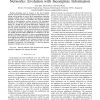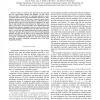176 search results - page 26 / 36 » Decision Problems for Nash Equilibria in Stochastic Games |
ATAL
2004
Springer
14 years 11 days ago
2004
Springer
Partially observable decentralized decision making in robot teams is fundamentally different from decision making in fully observable problems. Team members cannot simply apply si...
AI
2006
Springer
13 years 10 months ago
2006
Springer
So far, most equilibrium concepts in game theory require that the rewards and actions of the other agents are known and/or observed by all agents. However, in real life problems, a...
GAMESEC
2011
12 years 6 months ago
2011
Recent smartphones incorporate embedded GPS devices that enable users to obtain geographic information about their surroundings by providing a location-based service (LBS) with the...
WCNC
2010
IEEE
13 years 11 months ago
2010
IEEE
—Enabling users to connect to the best available network, dynamic network selection scheme is important for satisfying various quality of service (QoS) requirements, achieving se...
ICC
2007
IEEE
14 years 1 months ago
2007
IEEE
— There is a need for new spectrum access protocols that are opportunistic, flexible and efficient, yet fair. Game theory provides a framework for analyzing spectrum access, a ...



